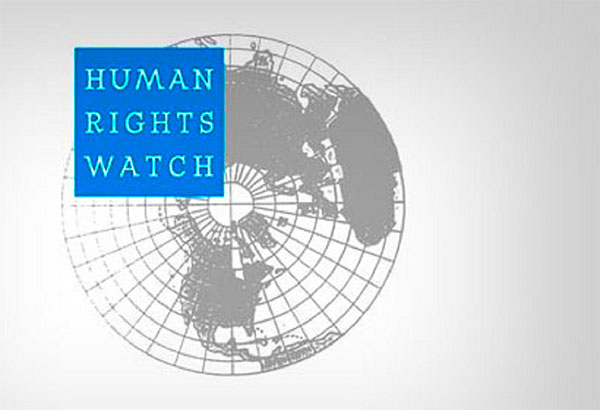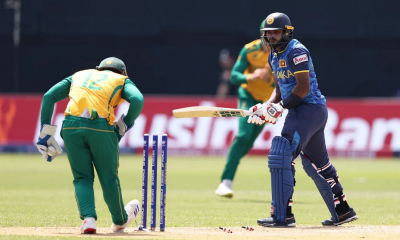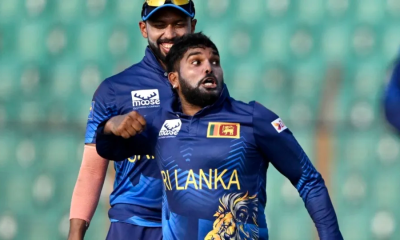News
Violence: HRW urges world to pressure Sri Lanka to respect fundamental freedoms

The Human Rights Watch (HRW) has urged foreign governments and international institutions, including the International Monetary Fund (IMF) and World Bank, which are offering assistance, to address Sri Lanka’s economic crisis, to insist that the government respect fundamental freedoms.
The following is the text of a New York date-lined statement issued by HRW on May 10: Clashes broke out in Sri Lanka on May 9, 2022 after government supporters attacked peaceful anti-government protest sites in Colombo, the capital, and elsewhere. The government should uphold the right to peaceful protest, ensure that the security force response to public disorder is proportionate and rejects excessive force, and promptly investigate and appropriately prosecute acts of violence.
Several hundred people, identifying themselves as supporters of Prime Minister Mahinda Rajapaksa, arrived by bus, in Colombo, on May 9, and advanced to the Galle Face Green, where protesters, calling for the resignation of the government, have been peacefully camped for several weeks. Witness accounts and video footage show government supporters attacking the protesters with clubs and other weapons and setting fire to tents. Hours later, Mahinda Rajapaksa resigned as Prime Minister.
“The attack on peaceful protesters by Sri Lankan government supporters has sparked a dangerous escalation, increasing the risk of further deadly violence and other abuses,” said Meenakshi Ganguly, South Asia Director at Human Rights Watch. “It is vitally important for the security forces to fully respect the right to peaceful assembly, and for those responsible for violence to be held to account.”
Kasumi Ranasinghe Arachchige, a protester who was at Galle Face Green, when the attack occurred, said that police forces at the scene, which included a water cannon truck, “retreated” when government supporters attacked protesters with knives and sticks. “They [government supporters] started destroying everything,” she said, describing damage to tents and other facilities, including temporary showers and a small library. “It seemed as if they knew what and who to look for.”
Over 150 people have been reported injured and at least five dead in different incidents, including the attack on Galle Face Green, and the government has imposed a nationwide curfew. The Human Rights Commission of Sri Lanka and the Bar Association, as well as foreign diplomats, condemned the attack on protesters and called for an impartial investigation.
In recent months, Sri Lanka’s economic crisis has provoked widespread protests calling for political reform and for the resignation of the President, Gotabaya Rajapaksa, and his brother Mahinda, the Prime Minister. On April 1, President Rajapaksa imposed a State of Emergency, lifting it five days later. The government reimposed a State of Emergency on May 6 after police fired teargas and arrested students protesting near Parliament, which was adjourned until May 17. Although the protests have been overwhelmingly peaceful, the police fatally shot a protester on April 19, and on several occasions have used teargas and water cannon against protesters. The authorities have made numerous arrests and repeatedly imposed curfews.
Following the attack on the protesters’ camp at the Galle Face Green, there were numerous violent incidents in Colombo and elsewhere in the country, including clashes between government supporters and anti-government protesters, and attacks on the property of ruling party politicians. In Nittambuwa, 50 kilometers from Colombo, police said that Amarakeerthi Athukorala, a government member of Parliament, opened fire on protesters blocking his car, wounding one and killing another, then fatally shot himself.
Concerned governments and international institutions, including the International Monetary Fund (IMF) and World Bank, which are offering assistance to address the country’s economic crisis, should insist that the government respect fundamental freedoms, Human Rights Watch said.
The latest State of Emergency was imposed on May 6, but the government did not immediately publish the emergency regulations laying out the special powers assumed. Under the International Covenant on Civil and Political Rights (ICCPR), to which Sri Lanka is a party, certain rights may be derogated, or restricted, under a State of Emergency, while other rights, including the right to life and prohibition of torture, may not under any circumstances be limited. Any derogation must be limited and proportionate. Foreign governments, including the United States and Canada, as well as the European Union, have questioned President Rajapaksa’s decision to assume emergency powers.
Sri Lanka has a poor record under successive administrations of investigating and prosecuting countless grave violations of human rights. During a previous government between 2005 and 2010, Gotabaya Rajapaksa and Mahinda Rajapaksa, as well as other senior figures in the current administration, were implicated in the killing and enforced disappearance of journalists and political activists and in numerous war crimes during the civil war that ended in May 2009.
“In recent weeks, thousands of Sri Lankans have peacefully protested against corruption and called for accountable governance and respect for human rights,” Ganguly said. “Pro-government supporters have responded to those calls with violence, which those in authority need to stop.”
News
US sports envoys to Lanka to champion youth development

The U.S. Embassy in Colombo welcomed the U.S. Sports Envoys to Sri Lanka, former National Basketball Association (NBA) and Women’s National Basketball Association (WNBA) players Stephen Howard and Astou Ndiaye, from June 8 through 14.
The Public Diplomacy section of the U.S. Embassy said that it would launch a weeklong basketball program intended to harness the unifying power of sports, made possible through collaboration with Foundation of Goodness and IImpact Hoop Lab.
While in Sri Lanka, Howard and Ndiaye, both retired professional basketball players, will conduct a weeklong program, Hoops for Hope: Bridging Borders through Basketball. The Sports Envoys will lead basketball clinics and exhibition matches and engage in leadership sessions in Colombo and Southern Province for youth aged 14-18 from Northern, Uva, Eastern and Western Provinces, offering skills and leadership training both on and off the court. The U.S. Envoys will also share their expertise with the Sri Lanka Basketball Federation, national coaches, and players, furthering the development of basketball in the country. Beyond the clinics, they will collaborate with Sri Lankan schoolchildren to take part in a community service project in the Colombo area.
“We are so proud to welcome Stephen and Astou as our Sports Envoys to Sri Lanka, to build on the strong people-to-people connections between the United States and Sri Lanka,” said U.S. Ambassador Julie Chung. “The lessons that will be shared by our Sports Envoys – communication, teamwork, resilience, inclusion, and conflict resolution – are essential for leadership development, community building, equality, and peace. The U.S. Sports Envoy program is a testament to our belief that sports can be a powerful tool in promoting peace and unity.”
News
Rahuman questions sudden cancellation of leave of CEB employees

SJB Colombo District MP Mujibur Rahuman in parliament demanded to know from the government the reasons for CEB suspending the leave of all its employees until further notice from Thursday.
MP Rahuman said that the CEB has got an acting General Manager anew and the latter yesterday morning issued a circular suspending leave of all CEB employees with immediate effect until further notice.
“We demand that Minister Kanchana Wijesekera should explain this to the House. This circular was issued while this debate on the new Electricity Amendment Bill was pending. There are many who oppose this Bill. The Minister must tell parliament the reason for the urge to cancel the leave of CEB employees,” the MP said.However, Speaker Mahinda Yapa Abeywardena prevented Minister Wijesekera responding to the query and said that the matter raised by MP Rahuman was not relevant.
News
CIPM successfully concludes 8th Annual Symposium

The Chartered Institute of Personnel Management (CIPM) successfully concluded the 8th Annual CIPM Symposium, which took place on 31st May 2024. Themed “Nurturing the Human Element—Redefining HRM in a Rapidly Changing World,” the symposium underscored the pivotal role of human resource management (HRM) in today’s dynamic global landscape. Since its inception in 1959, CIPM has been dedicated to advancing the HR profession through education, professional development, and advocacy, solidifying its position as Sri Lanka’s leading professional body for HRM.
Ken Vijayakumar, the President of the CIPM, graced the occasion as the chief guest. The symposium commenced with the welcome address by the Chairperson, Prof. Arosha Adikaram, followed by the Web Launch of the Symposium Proceedings and Abstract Book by the CIPM President. The event featured distinguished addresses, including a speech by Chief Guest Ken Vijayakumar, President of CIPM, and an address by Guest of Honor Shakthi Ranatunga, Chief Operating Officer of MAS Holdings Pvt. Ltd., Sri Lanka.
The symposium also featured an inspiring keynote address by Prof. Mario Fernando, Professor of Management and Director of the Centre for Cross Cultural Management (CCCM) at the University of Wollongong, Australia.
Vote of Thanks of the inauguration session was delivered by Dr. Dillanjani Weeratunga, Symposium Co-chair.
The symposium served as a comprehensive platform for researchers to present their findings across a wide range of critical topics in HRM. These included Cultural Diversity and Inclusion, Talent Development and Retention, Ethical Leadership and Corporate Social Responsibility, Adapting to Technological Advancements, Mental Health and Well-being at Work, Global Workforce Challenges, Employee Empowerment, and Reskilling and Upskilling.
The plenary session was led by Prof. Wasantha Rajapakse. Certificates were awarded to the best paper presenters during the valedictory session, followed by a vote of thanks delivered by Kamani Perera, Manager of Research and Development.
The annual symposium of CIPM was a truly inclusive event, attracting a diverse audience that spanned undergraduates, graduates, working professionals, research scholars and lecturers. This widespread interest highlights the symposium’s significance in the field of HRM, offering a unique opportunity for everyone to network and learn from scholarly brains.The CIPM International Research Symposium was sponsored by Hambantota International Port, Sri Lanka Institute of Information Technology (SLIIT), E B Creasy & Co. PLC, and Print Xcel Company.
























